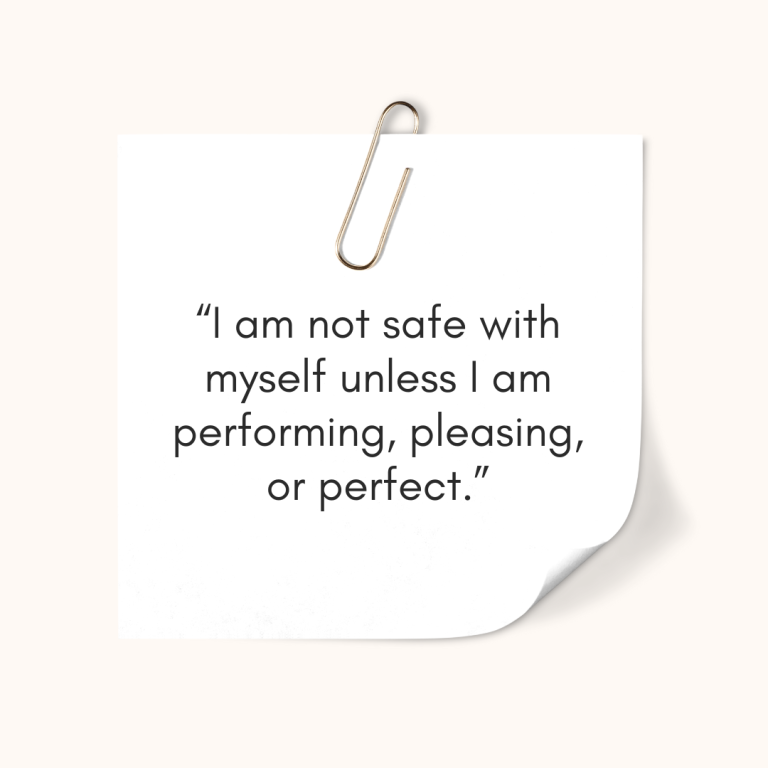When Self-Hatred Becomes a Lifestyle: The Hidden Root of Nervous System Dysfunction


Paige Elizabeth
Founder and Coach
For years, we’ve been told that burnout, anxiety, hormone chaos, and “adrenal fatigue” come from stress, trauma, or age.

But look closer — most of it is born from chronic self-rejection.
Not the obvious, loud kind.
The subtle, socially-approved kind.
The kind that hides behind perfectionism, people-pleasing, discipline, and over-performance.
This form of self-hatred is so normalized we call it “having a good work ethic.”
We reward it. We promote it. We post it.
And we wonder why entire generations of women can’t sleep, can’t digest, can’t feel joy, and can’t stop trying to fix themselves.
How Self-Hatred Becomes Somatic
Your nervous system doesn’t speak English — it speaks safety. Every thought, every internal dialogue, every act of self-neglect is translated into a physiological response.
When you criticize yourself, your brain releases stress chemicals. When you suppress emotion to stay “collected,” your vagus nerve constricts and shuts down digestion. When you override exhaustion, your body floods with cortisol to keep you functional.
Do that for a decade and the pattern becomes your baseline: Tight muscles. Shallow breath. Frozen emotions. Inflamed tissues. A body that lives in quiet defense against its own owner.
You can’t regulate a system that feels attacked by the person running it.
The Everyday Faces of Self-Hatred
Let’s name them, because once you see them, you can’t unsee them.
1. The Overachiever
You keep raising the bar. Accomplishment gives you a dopamine hit, then an immediate comedown.
You’re never satisfied because the goalposts are internal — “When I’m better, thinner, smarter, calmer…”
That’s not ambition. That’s a body begging for rest under the illusion of purpose.
2. The Caretaker
You anticipate everyone else’s needs before your own. You call it empathy, but it’s actually fear of rejection.
You over-give so you won’t be abandoned — and your body repays you with depletion, resentment, and adrenal exhaustion.
3. The Stoic
You pride yourself on not crying. You intellectualize pain. You “handle” everything.
That’s the nervous system in freeze mode — safety through suppression. Eventually it turns into numbness, depression, or chronic fatigue.
4. The Perfectionist
Every task is a test of worth. Mistakes feel like failure, rest feels like laziness.
You call it “high standards,” but it’s the subconscious belief that love must be earned.
5. The Optimizer
You chase protocols and supplements like salvation.
You biohack your way through exhaustion, never noticing that the pursuit itself is a trauma pattern — control as safety.
6. The Numb One
You don’t feel much anymore. You scroll, snack, or stay busy instead of sitting with discomfort.
That’s not apathy — that’s your body protecting you from an emotion you were never taught to hold.
Each of these patterns is rooted in the same belief:
“I am not safe with myself unless I am performing, pleasing, or perfect.”
The Biology of Self-Rejection
When you reject yourself psychologically, your body reads it as threat.
Cortisol and adrenaline rise.
Progesterone and thyroid function drop.
Digestion slows.
Blood sugar spikes and crashes.
Eventually, the HPA axis — the brain’s command center for stress — gets stuck in a feedback loop.
That’s when you start hearing labels like:
Adrenal fatigue
Hormone imbalance
Chronic anxiety
Burnout
But those are downstream. The real issue is upstream:
a nervous system trying to survive emotional self-abandonment.
You don’t need more willpower. You need reconciliation.
What Healing Actually Sounds Like
It doesn’t sound like affirmations plastered over pain.
It sounds like honesty.
It sounds like:
“I’m exhausted, and I deserve rest.”
“I’m angry, and that doesn’t make me ungrateful.”
“I’m scared, and I can hold that feeling without collapsing.”
“I don’t need to prove my value today.”
That’s nervous-system safety in real time.
Not perfection — permission.
The Physiology of Reconciliation
When the inner dialogue shifts from punishment to partnership, biology follows:
Cortisol finally drops.
The vagus nerve relaxes.
The gut re-engages digestion.
Hormones normalize.
The immune system stops overreacting.
You haven’t “fixed” anything; you’ve stopped attacking yourself.
This is why nervous-system work and trauma recovery aren’t just mental or emotional. They are biochemical corrections born from emotional safety.
The Re-Parenting Moment
Every person who heals reaches a breaking point — the moment they realize discipline isn’t the answer.
Gentleness is.
You stop outsourcing your authority to doctors, gurus, or partners.
You stop waiting for someone else to give you permission to rest.
You start listening to your body as if it’s a child that’s been ignored for years — and you promise not to abandon it again.
That’s not self-care. That’s re-parenting.
And it’s the single most regulating act you can perform.
Integration: From Hatred to Harmony
True healing isn’t found in another protocol.
It’s found in the quiet decision to stop living in opposition to yourself.
The moment you choose partnership over punishment, everything shifts.
The body exhales.
Energy returns.
Hormones balance.
The mind softens.
Because your biology has been waiting your whole life to feel safe in your own presence.
A Final Reflection
What if every symptom — every ache, fatigue, or flare-up — is your body saying, “Please stop hurting me.”
What if the exhaustion isn’t failure but feedback?
And what if your body doesn’t need to be fixed — it just needs to be trusted again?
That’s the work of nervous-system healing.
That’s the antidote to burnout.
And that’s what self-love actually looks like in practice — not bubble baths, but the radical decision to stop betraying yourself.
Your Body Doesn't Need to Be Fixed—It Needs to Be Heard.
This journey isn’t about more discipline or another protocol. It’s about moving out of silent defense and into inner harmony. If you’re done fighting yourself and ready to start the re-parenting moment your body has been waiting for, let’s explore this shift together.
Schedule a consultation to build a new baseline of safety and trust with your own nervous system.
